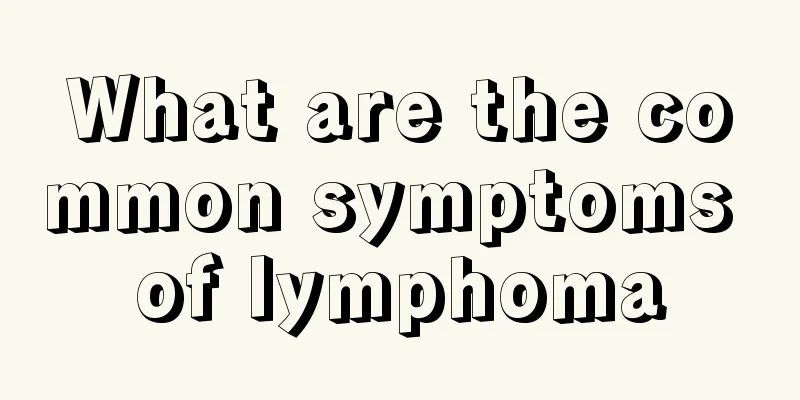What to do if your face becomes particularly hot due to skin inflammation

|
Inflammation is a physiological infectious reaction that we often encounter in our lives. Many diseases in the body are caused by bacterial infection, which triggers inflammation. Therefore, for infectious inflammation, taking anti-inflammatory drugs can often have a very significant effect, but when the skin is inflamed and the facial skin has abnormal symptoms such as redness and hotness, it is often necessary to keep the skin clean and use some external medications for healing. 1. Dermatitis is a general term for inflammatory skin diseases caused by various internal and external infections or non-infectious factors. It is not an independent disease. Its etiology and clinical manifestations are complex and diverse, and it recurs repeatedly, making clinical treatment more difficult. The concept and classification of dermatitis and eczema has always been a controversial issue in the dermatology academic community. In the past, the two were used as synonyms without strict distinction. For example, some people also called atopic dermatitis atopic eczema. 2. Most people now believe that dermatitis refers to inflammation of the skin, such as contact sensitization, skin infection, etc., while eczema refers specifically to certain non-infectious inflammations. At the same time, those with relatively clear pathogenesis or clinical characteristics are called "such and such dermatitis", while those with unclear causes are generally diagnosed as "eczema". The International Classification of Diseases (ICD)-10 includes more than 20 diseases in the dermatitis and eczema chapter, including contact dermatitis, atopic dermatitis, neurodermatitis, etc. Clinically, a specific dermatitis is often defined as a certain dermatitis based on the cause, site of onset or other clinical characteristics. For example, dermatitis caused by contact with a certain substance is called contact dermatitis, and dermatitis caused by internal medication is called drug-induced dermatitis. Eczema is a temporary concept. Once the cause is identified, the eczema should be diagnosed as a certain dermatitis instead of eczema. 3. ⒈ Maintain good personal hygiene and take a bath regularly. The water temperature should not be too high, 30 to 40 degrees Celsius is appropriate. 4. ⒉ Change clothes and bed sheets frequently, and wash and dry personal items such as mats and quilts regularly. 5. ⒊ Keep the room well ventilated, the environment clean and tidy, and avoid moisture. 6. Eat a healthy diet, get enough sleep, and do some exercise to strengthen your body. When traveling, it is best to wear long pants to prevent insect bites on your lower limbs. 7. The above introduces the care work for insect bite dermatitis. If you are accidentally bitten by mosquitoes, you should avoid scratching, because this will cause secondary infection or local lymph node swelling. After being bitten by mosquitoes, for mild cases, some medicine can be applied externally. For severe itching, antihistamines can be taken orally. For serious conditions, people should go to a specialized hospital for the treatment of insect bite dermatitis to avoid delaying the condition. |
<<: What should teenagers do when they get acne
Recommend
What causes nausea after medical abortion
For women who accidentally become pregnant, there...
What is the reason for feeling sleepy after dinner
Feeling sleepy is an experience that everyone has...
How to distinguish the front and back of contact lenses
Many people have to wear glasses all year round d...
Why is the temperature of the left hand higher than that of the right hand
The temperature of the body determines a person&#...
Who can't eat snake meat
In the eyes of many people, snake meat should hav...
What are the dangers of peeling off blackheads
Blackheads are formed when excessive oil secretio...
What to do if thyroid cancer causes swallowing problems
Thyroid cancer is a common endocrine tumor in cli...
What are the early symptoms of cervical cancer? Is heavy bleeding likely only in the late stages of cervical cancer?
Cervical cancer seriously threatens women's l...
How to deal with furniture smell
Newly bought furniture generally has a smell, and...
What are the symptoms of thyroid tumor
The symptoms of thyroid adenoma vary, and this di...
What is the reason for bitter mouth and dizziness
People must pay attention to their bodies, becaus...
Who are the most susceptible to liver cancer? These five types of people need to pay attention
If you suffer from viral hepatitis diseases such ...
What to do if the legs of glasses are broken
Many people who wear glasses have experienced bro...
Family members should pay more attention to the care of lymphoma patients
The incidence of lymphoma in my country is quite ...
How long does it take to thaw steak
Steak is a very delicious Western food. After it ...









